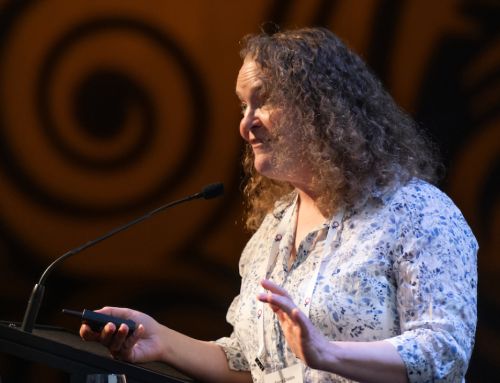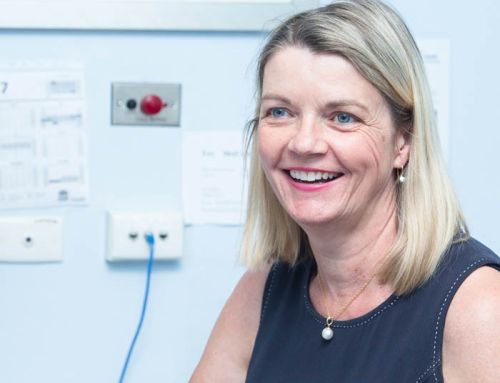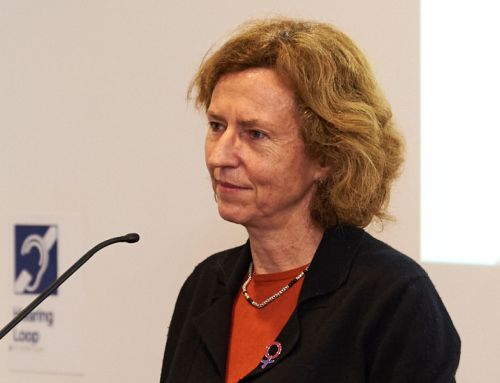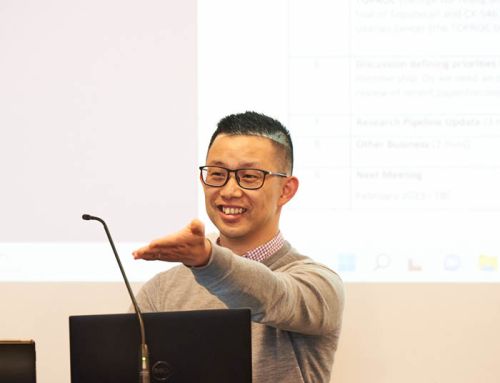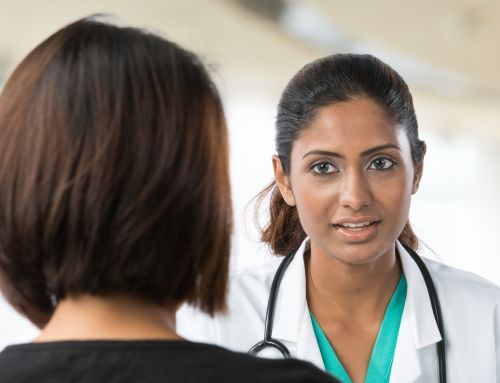In this interview, we learn how newly appointed ANZGOG Chair, Prof Clare Scott‘s experiences in translational research is shaping the way she approaches her new role, what her goals and aspirations are for ANZGOG, and we discover some fun facts about what she loves to do in her spare time.
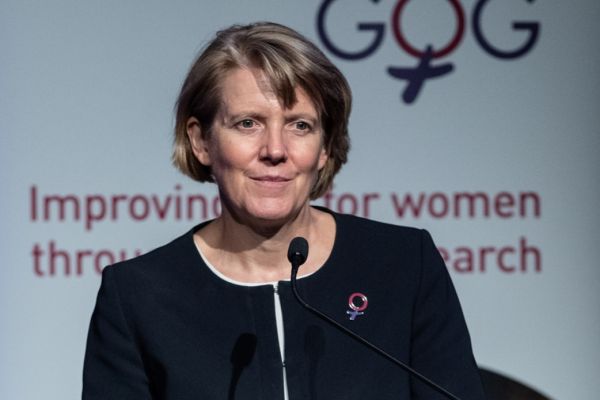
Prof Scott officially took over as ANZGOG Chair at the ANZGOG 2022 ASM
How and why did you get involved in rare cancers research as a Medical Oncologist?
I was already focusing on ovarian cancer research. The thing is, there are so many other types of cancers that are rare, in particular, rare gynaecological cancers, that do not have enough research to underpin adequate treatment options. It became really clear that we could take similar approaches for rare cancers that we were taking for ovarian cancer. Our Rare Cancers Australia consumers, Kate and Richard Vines, were very keen for me to go down that path!
How and when did you first get involved with ANZGOG and what does ‘being a member of ANZGOG’ mean to you?
“ANZGOG to me, represented a way forward to improve the chances, using translational designs, of making sure that trials were more likely to be informative, delivering answers for women.”
I have been involved in ANZGOG since about 2012, after having been in ovarian cancer research by that time for a couple of years. Once my lab had started to generate some data, we wanted to share that with other ovarian cancer researchers in Australia. Also, I was very interested in how to improve translational outcomes of clinical trials. I had been ensuring that we collected samples from very important PARP inhibitor trial patients from early on in PARPi development. In fact, I became involved in our international umbrella organisation, GCIG, as the Co-Chair of the Translational Research committee from 2013 onwards.
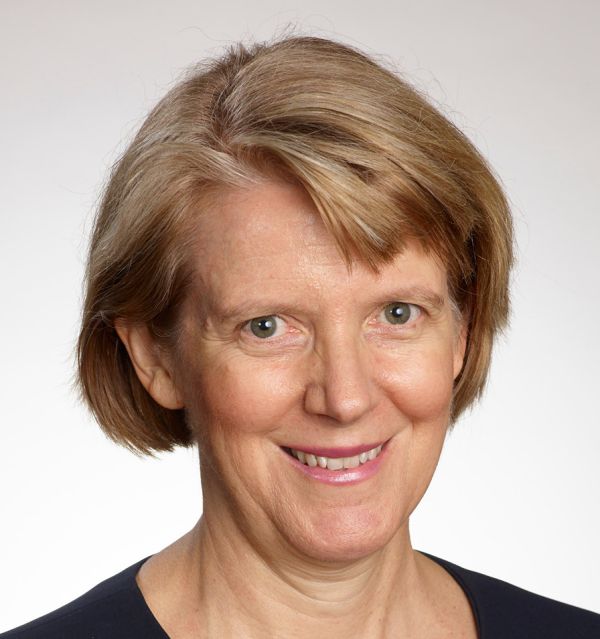
Prof Scott is Joint Division Head, Clinical Translation, (Cancer) at the Walter and Eliza Hall Institute of Medical Research.
ANZGOG to me, represented a way forward to improve the chances, using translational designs, of making sure that trials were more likely to be informative, delivering answers for women. From my discussions with many women, that is what women want, both from trials and from the sample donation they generously make. Even if a trial does not have the outcome we hope for, we have a good chance of still working out why, if we have collected enough samples of tumour and blood to perform smart translation. Technology today is amazing. Today there is a whole team approach through ANZGOG. To me, being a member of ANZGOG means that you can get access to guidance about translational trial design and activity and receive support, both practical and financial, in being part of, or designing, such trials to improve the lives of women with gynaecological cancer.
What is your main goal as Chair of ANZGOG?
My primary goal as Chair of ANZGOG is to continue our core research activity, which is to conduct insightful clinical trials for women with gyneacological cancer. This is what ANZGOG does best, and I aim to continue to improve the way we do that, harnessing improvements in technology as well as the power of the community to help women with gynaecological cancer.
How important are consumers to ANZGOG?
Our consumers are part of our core membership. They have the ability to bring their expertise and experience to our trials, and all aspects of our activities. They are one of our key stakeholders, both inside and outside of ANZGOG, as they remind us just how important research is. I really want us to bring the community with us in every way we possibly can.
“Our consumers are part of our core membership.”
Tell us about the power of translational research…
Translational research has been a huge part of my life, and we know that it allows us to answer questions and make our trials more efficient and more valuable going forward.
The power of translation and adding precious translational samples to our trials means that we can answer questions and make sure that we really understand how a drug works and which patients should receive that drug for their cancer. If we don’t do that, we’re missing priceless opportunities and wasting precious time for our patients.
How did it feel to be back at the ANZGOG ASM in person?
Unbelievably good! Almost like the past two years had not happened. We were able to talk non-stop, taking advantage of every break to put in place those extra collaborations, or to trouble shoot a problem or to plan an extra project. None of that was easy on the side with zoom – some of it happened but only a small fraction. Nothing really replaces human interaction. Although virtual platforms can be very useful when you cant be there!
 How can we improve outcomes for rare cancer patients?
How can we improve outcomes for rare cancer patients?
More than half of gynecological cancers are rare, and many rare cancer patients don’t have the availability of targeted drug access because no one’s been able to study their particular rare cancer in enough detail by collecting translational samples. Translation allows us the ability to study those cancers in more detail. That’s the only way we’re going to be able to access matched-drugs for patients who have truly rare cancers – by studying samples from their cancer so as to be sure what drug will be best for them.
“ANZGOG has achieved so much over the last four years and has grown to an organisation which now can independently sponsor clinical trials and really support particularly junior investigators to get to the point where they can independently submit and be successful in running clinical trials.”
Where do you think ANZGOG now sits in the global gynaecological cancer space, and why is that important?
We’re at a great point in our relationships, both nationally and internationally. In the Gynecologic Cancer Intergroup – the peak international gynaecological cancer research group – we’re very fortunate to have a greater number of ANZGOG members in leadership positions. That means that our ANZGOG membership stands to be able to contribute to international clinical trial design more now than ever before.
This is extremely exciting, not only for ANZGOG members, but also for women in Australia and New Zealand with gynaecological cancer. This means that these women can participate in these trials and have access to drugs. This is incredibly important and we hope this means that women will be able to benefit by responding to these drugs that they wouldn’t otherwise have access to for a further few years.
ANZGOG has had a strong focus on signal seeking research over the last few years, how do you see this developing further?
We have learned a lot from our experience with signal seeking research in ovarian cancer (OASIS) and have refined our guidelines so that our future trials will be even more successful. We want to continue to be sure that we fill gaps in what is available for women, as well as reaching out to researchers throughout Australia and New Zealand to encourage them to apply for funding. We aim to fund small smart nimble trials which are innovative in ovarian cancer, as before, and hopefully also with our new endometrial cancer initiative called EDEN.
“We have learned a lot from our experience..”
Tell us something that fellow ANZGOG members may not know about you…
I love singing and photography and now paddle-boarding. So, assuming I get to do any of those things, I will be working towards some work-life balance which is important for everyone! At least with my iphone I can have fun with photographs anywhere, even without my big camera. So that is the one thing that I can do anytime. Good to have an outlet!
Any last words?
ANZGOG has achieved so much over the last four years and has grown to an organisation which now can independently sponsor clinical trials and really support particularly junior investigators to get to the point where they can independently submit and be successful in running clinical trials. We would not have been able to do this without the calm leadership and stewardship of both Phillip Beale and Alison Evans, and all of their operational staff. I’d really like to thank them for all the hard work that they’ve done in getting us to this stage.


 How can we improve outcomes for rare cancer patients?
How can we improve outcomes for rare cancer patients?